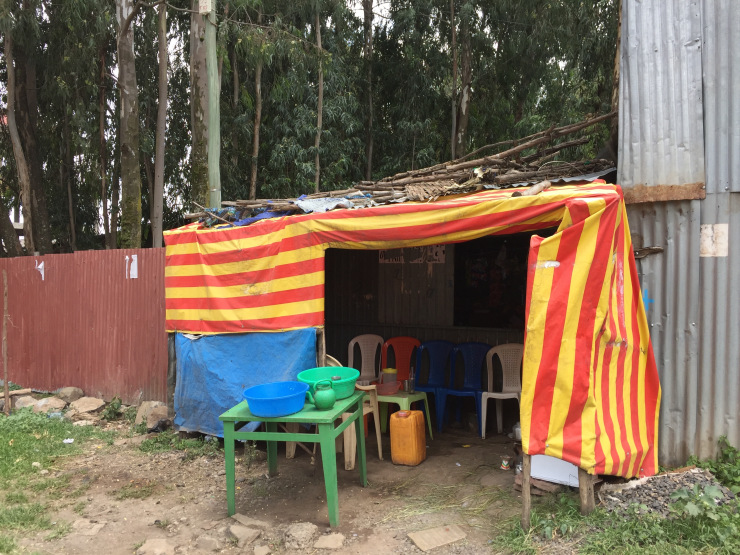I (Elizabeth) LOVE African markets. I love the winding dirt paths and stalls stuffed with plastic, metal and fabric wares- everything you need to run a proper home here. I love the search for that “one thing” that I need or want- asking in my broken version of the local language supplemented with a broad pantomiming that always makes the gathering crowd laugh.
Last weekend I was wandering around our neighborhood here in Gondar, chatting with the tuck-shop owners and waving hi to the kids, when I found my new favorite market spot.
The market seemed to have everything, so I decided to ask again about the local hand spindles (in Amharic: ‘inzert’) . My hobby at home is spinning and knitting, and one of the things that fascinates me about Ethiopia is the living history of cotton spinning and weaving. In previous trips to the heart of the city, however, I had been unable to get my hands on an inzert.
Two boys were following me, so I decided to ask them. “Inzert alleh?” (“are there spindles here?”) The boys nodded enthusiastically and led me through several winding aisles of market stalls, to the very back, where a single stall appeared to sell spices and incense only.
When we arrived the boys yelled “inzert!”, and the proprietress uncovered a stash of seven or eight small, local spindles. “Snt naw?” I asked “how much”. “4 Birr”- about 17 cents each.
Women who ran the nearby stalls started to gather, wondering what this foreigner would want with a local hand spindle. There were lots of laughs and smiles as I tried to pantomime that I, too, used a spindle to make yarn.
The stall also sold cotton for spinning, so I loaded up with two big bags full. the spindles were crude, and were missing a hook at the top- essential for use. Easily fixed with a stick and a pocket knife, I reasoned.
As I walked home, more women saw the spindle and cotton in my bag and asked me, laughing, if I knew what to do with them. I wished I could demonstrate, but without the homemade hook, I couldn’t do much. I was trying to communicate this when one of the women invited me into a large building used for milling teff, the local grain. She understood about the hook and pulled out a small branch with large thorns- perfect for adding to my spindle. She took the spindle and split the top, added a whittled thorn, and sanded it until it was perfectly wedged into place. Meanwhile, the kids hanging around were practicing their English as I waited.
Evidently this is my name “Eliza” spelled in Amharic script.
Evidently this is my name “Eliza” spelled in Amharic script.
When my spindle was finished it was ready for spinning. the Ethiopian way of holding a spindle is much different that what I am used to, and the group of women which had gathered laughed as they watched me try to make a cotton string. I am eager to incorporate their demonstrations as I learn to spin the Ethiopian way. I’ll update you with my progress!
The finished spindle, among bales of teff grain.














